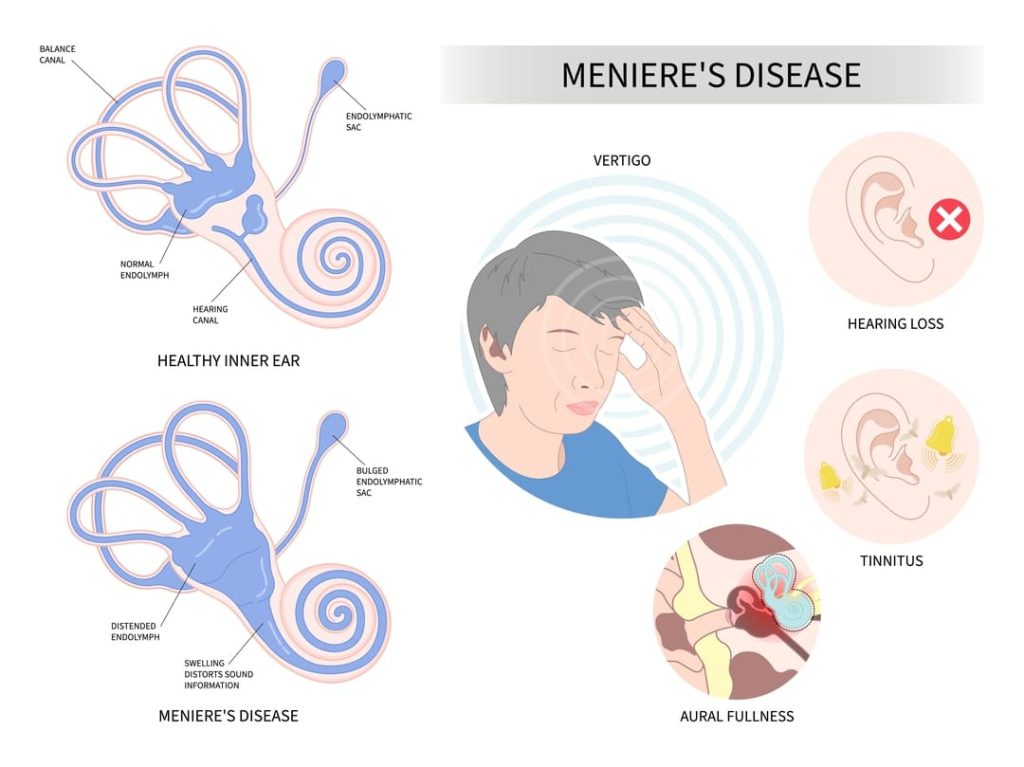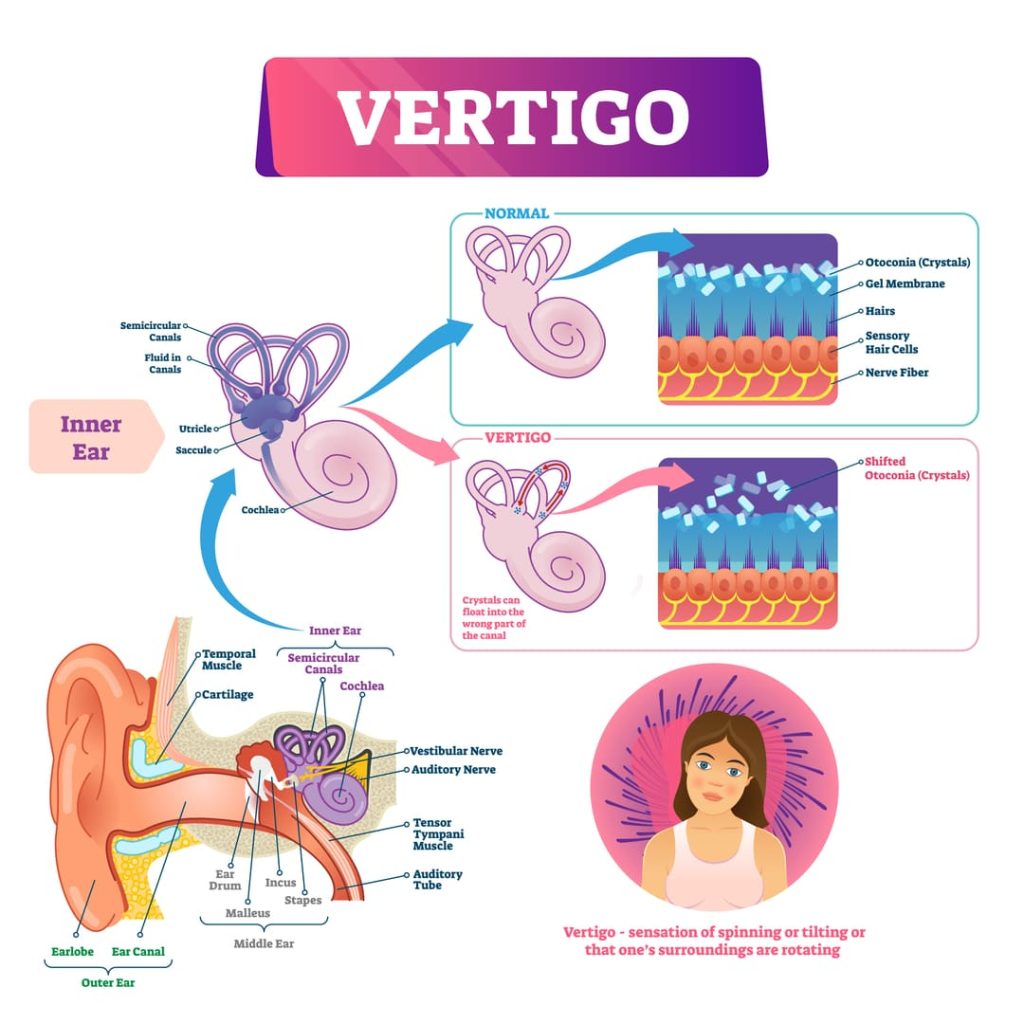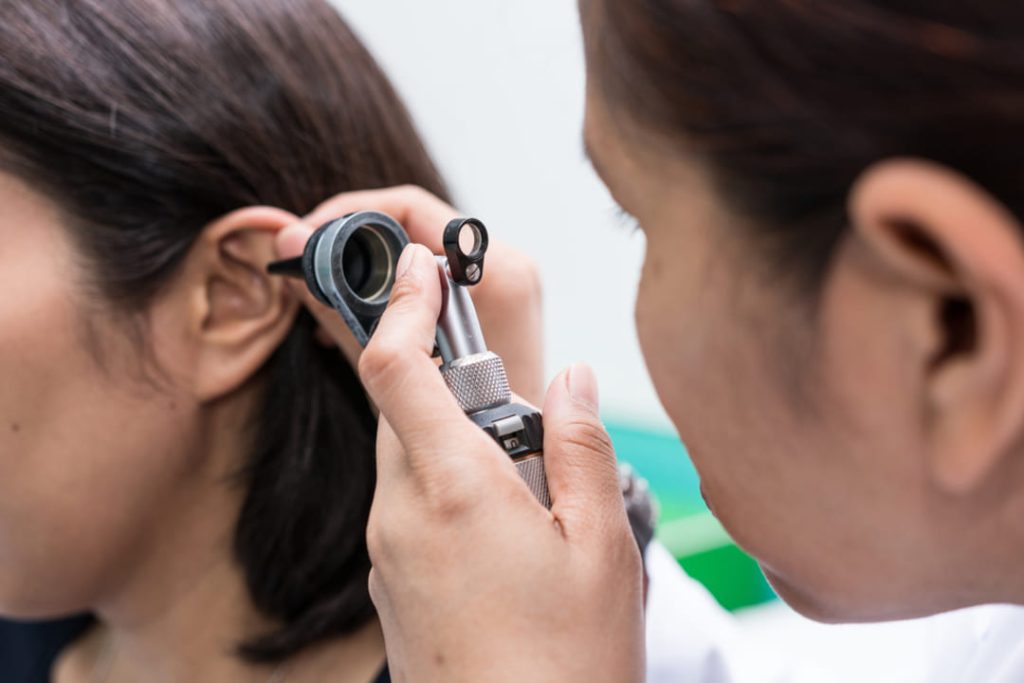This Ultimate Guide to a VA rating for Vertigo and Meniere’s Disease will explain how the VA rates these conditions, how to get service connected, and more.
We will also cover the common symptoms of Meniere’s disease and vertigo, the VA disability claims process, how to get a VA rating for vertigo and Meniere’s disease, VA disability benefits, and more.
We’ll also examine what you need to know about the VA rating system and how to gather the evidence you need to support your claim.
You will soon be able to seek the highest available VA rating for vertigo and Meniere’s disease and get the VA benefits and compensation you deserve.
- What is Vertigo and Meniere’s Disease?
- Common Symptoms and Causes of Vertigo and Meniere’s Disease
- VA Rating for Vertigo and Meniere’s Disease
- Service Connection for Vertigo and Meniere’s
- Is it Difficult to Service-Connect Vertigo and Meniere’s Disease?
- Meniere’s Disease VA Ratings
- How Does the VA Rate Meniere’s?
- Vertigo VA Ratings
- How the VA Rates Vertigo
- Can You Get a VA Rating for Dizziness?
- Rating and Denials for Vertigo and Meniere’s
- Will Tinnitus Affect My Claim?
- What if My Meniere’s or Vertigo Claim was Denied?
- Vertigo and Meniere’s as Secondary Conditions
- VA Rating for Vertigo Secondary to Tinnitus
- NEED MORE ASSISTANCE?
- About the Author

What is Vertigo and Meniere’s Disease?
Meniere’s disease (endolymphatic hydrops) is an inner ear issue that affects both hearing and balance. It is caused by a fluid buildup in the labyrinth, a part of the inner ear. The fluid buildup interferes with nerve signals to the brain, which later causes recurring dizziness, loss of balance, and hearing loss.
Although there is no known cure for this illness, there are steps that can be taken to reduce symptoms of this disease. For example, hearing aids can help to ease the symptoms of hearing loss, while diuretics can help to reduce fluid buildup.
When there is no real movement, vertigo is the sensation of rotation or spinning movement – either the self or surrounding objects – that is accompanied by a sense of dizziness. When Meniere’s disease affects the inner ear, it can cause vertigo, dizzy spells, hearing loss, and ringing in the ears. These recurring balance issues prevent many veterans from finding substantially gainful employment.

Common Symptoms and Causes of Vertigo and Meniere’s Disease
If you’re attempting to get service-connected for vertigo and Meniere’s disease, you need to review the symptoms first. If you are commonly experiencing any of the following, it is time to seek medical help and potentially look into getting a diagnosis. Remember, the symptoms can affect one ear or both.
Common Symptoms
- Dizzy spells (feeling like you or your surroundings are spinning) that last several hours?
- Severe ringing in your ears
- Hearing loss
- Ear pressure or aural fullness
- Nausea and episodes of vertigo
- And finally, do you often find yourself losing balance
While the underlying cause of Meniere’s disease is unknown, a buildup of fluid in the inner ear is responsible for symptoms. This disrupts messages to the brain from both the balance and hearing nerves, causing a loss of control over these systems.

Vertigo has many potential causes, such as:
- Meniere’s disease
- benign paroxysmal positional vertigo (BPPV)
- viral infection
- labyrinthitis
- vestibular neuritis
- improper fluid drainage
Vertigo is a common symptom of a variety of diseases. Vertigo can, however, be associated with additional symptoms, including:
- nausea and vomiting
- balance problems
- tinnitus
- headaches
- motion sickness
- a feeling of fullness in the ear
Nystagmus, in which the eyes move side to side uncontrollably.
Knowing the symptoms and causes of these conditions will help you to fully understand them and see if they are applicable to you, as they may have a relationship to your military service.

VA Rating for Vertigo and Meniere’s Disease
VA Rating for Vertigo and Meniere’s Disease
If you are ready to begin the process of getting a VA rating for vertigo or Meniere’s disease, there are a few things you should know. Here is the process at a glance.
- Receive a diagnosis: The first step in getting a VA rating for vertigo or Meniere’s disease is to receive a diagnosis that includes test results.
- Get an Independent Medical Opinion/Medical Nexus Letter: In order to get a VA rating, you will need an independent medical opinion or a Nexus Letter. This letter should include information on your symptoms and say how long you have been suffering from the condition. The letter should also list the treatment you have received.
- Submit a claim to the VA: Once you have gathered the necessary evidence, you will need to submit a claim to the VA. You can do this online (via va.gov), by regular mail, or in person at your local VA office.
- Attend a VA Compensation and Pension (C&P) Examination: After you have submitted your claim, you will need to attend a VA examination. During this exam, a VA doctor will assess your symptoms and determine your level of disability.
- Wait for a decision from the VA: After you have attended your VA examination, you will need to wait for a decision from the VA. This decision can take several months. If your claim is approved, you will be given a disability rating that will determine the amount of compensation and benefits you receive.
Service Connection for Vertigo and Meniere’s
The first step in obtaining disability benefits is to submit an application for service-connection. Veterans can file their claims via va.gov, mail, or in person. Veterans should use VA Form 21-526 to submit an initial claim only when filing in paper form/mail.
Make sure to include any relevant documentation. Veterans who had a military occupational specialty (MOS) that exposed them to loud engines, equipment, or gunfire should submit service personnel records detailing their work-related duties, as these assignments may support a claim for service-connection.
If you have a diagnosis of vertigo or Meniere’s disease from a civilian doctor, make sure to include these records as well. If you have not been diagnosed, you will need to connect with your doctor(s) to get diagnosed. The C&P exam doesn’t typically provide a diagnosis since it is an evaluation of the claim that has been submitted.
Veterans who have a history of exposure to loud noises can also give statements describing how this strain has had an effect on their inner ear and produced vertigo symptoms.
To be considered for vertigo VA rating, you will need:
- A current diagnosis of vertigo
- Evidence of an event, injury, or illness that took place while you were in the military
- A medical nexus (link) between your current condition and the event, injury, or illness that occurred during your military service.
To be eligible for a Meniere’s disease VA rating, veterans must first show to the VA that their illness is attributable to their active-duty military service.
They must establish the following three elements in order to get a direct service connection:
- A currently diagnosed ear condition
- An in-service occurrence that may have triggered the condition
- A medical nexus linking the in-service event to the current diagnosis.
You DESERVE a HIGHER VA rating.
WE CAN HELP.
Take advantage of a FREE VA Claim Discovery Call with an experienced Team Member. Learn what you’ve been missing so you can FINALLY get the disability rating and compensation you’ve earned for your service.
Is it Difficult to Service-Connect Vertigo and Meniere’s Disease?
Meniere’s syndrome is the #36 most claimed VA disability, and vertigo is the #49th most commonly claimed. The frequency of noise exposure in the military means that there are many precedents for service-connecting ear problems. If you have a diagnosis from a civilian doctor, evidence of exposure to loud noises while in the military, and an Independent Medical Opinion, you may be able to successfully obtain a service connection.
Meniere’s Disease VA Ratings
VA Ratings for Meniere’s Syndrome are 30%, 60%, and 100%. The VA rates Meniere’s syndrome as an ear condition under CFR 38, part 4.87, VA Schedule of Ratings, diagnostic code 6205, Meniere’s syndrome (endolymphatic hydrops).
How Does the VA Rate Meniere’s?
The VA rates Meniere’s disease using the General Rating Formula for Diseases of the Ear. This rating system takes into account the frequency, severity, and duration of a veteran’s episodes of vertigo, as well as any balance problems or hearing loss that may have resulted from the condition.
The ratings are determined by how often symptoms occur.
- Hearing impairment with attacks of vertigo and cerebellar gait occurring more than once weekly, with or without tinnitus rates at 100%
- Hearing impairment with attacks of vertigo and cerebellar gait occurring from one to four times a month, with or without tinnitus rates at 60%
- Hearing impairment with vertigo less than once a month, with or without Tinnitus rates at 30%
Note: Evaluate Meniere’s syndrome either under these criteria or by separately evaluating vertigo (as a peripheral vestibular disorder), hearing impairment, and tinnitus. You should use whichever method results in a higher overall evaluation. Do not combine an evaluation for hearing impairment, tinnitus, or vertigo with an evaluation under diagnostic code 6205.
This rating system takes into account the frequency, severity, and duration of a veteran’s vertigo attacks, as well as any balance problems or hearing loss that may have resulted from the condition.
Vertigo VA Ratings
The VA rates vertigo under CFR 38, Part 4.87, VA Schedule of Ratings, using one of two diagnostic codes, depending on the severity of your symptoms: DC 6204, peripheral vestibular disorders, or DC 6205 Meniere’s syndrome.
Vertigo VA Ratings range from 10% to 30% under the DC 6204, and while under the 6205, rating ranges from 30% t0 100%.
The highest rating for vertigo is 100 percent and includes severe symptoms of hearing impairment with attacks of vertigo and cerebellar gait occurring more than once weekly, with or without Tinnitus.
When considering service connection for vertigo, be sure to examine the evidence of record carefully. Vertigo is most often caused by a physical condition such as traumatic brain injury (TBI), Meniere’s disease, vestibular neuritis/labyrinthitis, MS, stroke or tumor.
When a patient’s vertigo is appropriately diagnosed, the service connection should be assigned to that diagnosis rather than “vertigo.” However, if the cause of the vertigo is unknown or established, such as an inner ear injury, and no known or established underlying pathology is present:
- An event in service (such as a nonspecific diagnosis of vertigo in service)
- Vertigo presents post-service
- A nexus establishing the vertigo post service is connected to the event in service and
- The condition is not associated with any other disease or injury.
How the VA Rates Vertigo
The VA will select the diagnostic code that most accurately describes your Vertigo symptoms in terms of frequency, severity, and duration.
- Vertigo with dizziness and occasional staggering rate at 30%.
- Vertigo with occasional dizziness rate at 10% under DC 6204.
Note: Objective findings supporting the diagnosis of vestibular disequilibrium are required before a compensable evaluation can be assigned under this code. Hearing impairment or suppuration shall be separately rated and combined.

Can You Get a VA Rating for Dizziness?
While there is no specific VA rating for dizziness, you may still qualify for disability under the VA rating for peripheral vestibular disorders or Meniere’s syndrome, depending on the severity of your condition.
Dizziness is one of the most common symptoms of vertigo and Meniere’s syndrome, and if you can prove your condition is service-connected, you may receive a VA rating of up to 100%.
Generally, if your dizziness causes staggering while walking, you’ll be awarded a 30% rating, while occasional dizziness brings a 10% VA rating.
Rating and Denials for Vertigo and Meniere’s
Before you attempt to submit a claim, obtain a medical diagnosis for Meniere’s syndrome or vertigo. You will be rejected as a claimant if you don’t have a diagnosis of Meniere’s syndrome or vertigo. Claim may also be denied without the right evidence, such as Independent Medical Opinion.
If your MOS is on the noise exposure listing with the evidence required, it will qualify. The noise exposure listing is a list of MOSs in each branch that ranks each MOS on the likelihood of noise exposure. It is used to prove service-connection for ear problems diagnosed after service.
Will Tinnitus Affect My Claim?
When filing for VA disability benefits related to Meniere’s disease or vertigo, a tinnitus claim is helpful but not needed. These disability claims are both related to inner ear problems and cause hearing problems. Even so, the rating scale is the same with or without a tinnitus claim.
What if My Meniere’s or Vertigo Claim was Denied?
If your Meniere’s or vertigo claim was denied, you could consider appealing the decision. Veterans have the option to file an appeal via a Higher Level Review, Supplemental Appeal, or through the Board of Veterans Appeals.
If you are not sure how to file an appeal or what evidence you should submit, you may want to consider inquiring with us here to help with your case.
You can also try to claim the individual symptoms separately. If you can’t show that you have Meniere’s disease, for example, you may receive one VA disability rating for vertigo, another for tinnitus, and yet another for hearing loss.
You can then combine those disabilities like this:
- A 30% rating for vertigo or dizziness
- A 10% rating for tinnitus
- A 50% rating for migraine headaches
After these ratings are combined and rounded, you will have a 70% rating.
Vertigo and Meniere’s as Secondary Conditions
If you are already receiving disability benefits for another condition, you may still be able to receive VA disability benefits for vertigo or Meniere’s disease as a VA secondary condition. To do this, there should be a relationship between your current disability and Meniere’s condition or vertigo.
Meniere’s Disease Secondary to Tinnitus
In order to file a VA claim for Meniere’s Disease secondary to tinnitus, you will need to provide evidence, like an Independent Medical Opinion, that your Meniere’s disease is related to your already service-connected disability.
If you are seeking a higher disability rating and believe that your Meniere’s disease is affecting your ability to work, you may want to file a claim for an increased rating.
VA Rating for Vertigo Secondary to Tinnitus
Yes, vertigo can be considered a secondary condition to tinnitus. In order to file a VA claim for vertigo as a secondary condition, you will need to provide evidence of a diagnosis of vertigo from a civilian doctor and evidence like an Independent Medical Opinion that your vertigo is directly related to your tinnitus.
Many veterans have succeeded in getting a VA rating for vertigo or Meniere’s disease, but the process can be complicated. If you are having trouble getting a VA rating for your condition, reach out to us.
There are multiple ways to claim benefits based on the different disability ratings the VA has set up. Whether they are caused by a viral infection or another in-service event, recurring episodes of vertigo are serious. Veterans who suffer from ringing in one ear of both ears, nausea, and the other most common symptoms should seek benefits. Applying for benefits can be a difficult process, but it may be worth it to get the monthly payments that VA disability benefits provide.
We can help you navigate the claims process and get the benefits you deserve.

NEED MORE ASSISTANCE?
Most veterans are underrated for their disabilities and, therefore, not getting their due compensation. At VA Claims Insider, we help you understand and take control of the claims process, so you can get the back pain VA rating and compensation you’re owed by law.
Our process takes the guesswork out of filing a VA disability claim and supports you every step of the way in building a fully-developed claim (FDC)—so you can increase your rating FAST!
If you’ve filed your VA disability claim and have been denied or have received a low rating—or you’re unsure how to get started—reach out to us! Take advantage of a FREE VA Claim Discovery Call. Learn what you’ve been missing—so you can FINALLY get the disability rating and compensation YOU DESERVE!
We’ve supported more than 25,000 veterans to win their claims and increase their ratings. NOW IT’S YOUR TURN.
About the Author

Eddie Chavarria
Eddie is a 14-year Amy and National Guard veteran. He spent 6 years enlisted and deployed to Iraq in 2004. On returning, he decided to apply for flight school and was accepted. Eddie ended his career as Warrant Officer with three aircrafts under his belt (Blackhawk, Apache A/D and Lakota).
After transitioning into consulting/sales through a recruitment at Dell, Eddie chose to work at VA Claims Insider out of a desire to help his fellow brothers and sisters. As a disabled veteran, he understands the frustration and anxiety associated with dealing with the VA and wanted to help.
Eddie says: “My success to this day comes from the simple recipe of listening, understanding and helping.” Eddie enjoys spending time with his young daughter and credits his family with much of his success.
You can connect with Eddie at [email protected].



